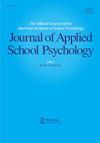Gender Differences in Defending Behavior among Elementary School Students Trained in a Bullying Bystander Program: Is Self-Esteem a Moderator?
IF 1.5
Q4 PSYCHOLOGY, EDUCATIONAL
引用次数: 2
Abstract
Abstract This study evaluated the relationship among use defending behaviors, gender, and self-esteem among students trained in a brief, bystander bullying intervention (N = 93). Students were taught four specific strategies to use to defend targets of bullying. We used hierarchical regression analyses to test a moderator model in which we hypothesized females would report using defending behaviors more frequently than males post-training and that baseline self-esteem would moderate this relationship. Findings partially supported our hypotheses. Specifically, for “Turning it Over” (i.e., reporting bullying to an adult) and “Coaching Compassion” (i.e., gently confronting the perpetrator to communicate their behavior is not acceptable), the gender x self-esteem interaction was significant, suggesting that females with high self-esteem were most likely to use these defending behaviors post-training. In contrast, for “Stealing the Show” (i.e., using their sense of humor to distract the peer audience’s attention away from the target), high self-esteem was positively associated with frequency of using this defending behavior for both males and females. For “Accompanying Others” (i.e., reaching out to the target to offer support), females used this strategy more frequently than males, and self-esteem was not a significant moderator. Findings highlight the importance of gender and self-esteem as significant factors that influence whether or not bystanders defend targets of bullying post-training. Implications for bystander training in school-based bullying prevention programs are discussed.参与霸凌旁观者项目的小学生在防卫行为上的性别差异:自尊是否起调节作用?
摘要本研究评估了在短暂的旁观者欺凌干预中接受训练的学生的使用防御行为、性别和自尊之间的关系(N = 93)。学生们被教授了四种具体的策略来保护欺凌的目标。我们使用分层回归分析来测试一个调节模型,在该模型中,我们假设女性在训练后会比男性更频繁地报告使用防御行为,并且基线自尊会调节这种关系。研究结果部分支持了我们的假设。具体而言,对于“扭转局面”(即向成年人报告欺凌行为)和“辅导同情”(即温和地面对施暴者以传达他们的行为是不可接受的),性别与自尊的互动是显著的,这表明高自尊的女性最有可能在训练后使用这些防御行为。相比之下,对于“偷拍”(即利用他们的幽默感分散同伴观众对目标的注意力),无论男性还是女性,高自尊都与使用这种防御行为的频率呈正相关。对于“陪伴他人”(即向目标伸出援手提供支持),女性比男性更频繁地使用这种策略,自尊并不是一个重要的调节因素。研究结果强调了性别和自尊的重要性,它们是影响旁观者在训练后是否为欺凌目标辩护的重要因素。讨论了旁观者培训在学校欺凌预防项目中的意义。
本文章由计算机程序翻译,如有差异,请以英文原文为准。
求助全文
约1分钟内获得全文
求助全文
来源期刊

Journal of Applied School Psychology
PSYCHOLOGY, EDUCATIONAL-
CiteScore
2.40
自引率
10.00%
发文量
7
期刊介绍:
With a new publisher (Taylor & Francis) and a new editor (David L. Wodrich), the Journal of Applied School Psychology will continue to publish articles and periodic thematic issues in 2009. Each submission should rest on either solid theoretical or empirical support and provide information that can be used in applied school settings, related educational systems, or community locations in which practitioners work. Manuscripts appropriate for publication in the journal will reflect psychological applications that pertain to individual students, groups of students, teachers, parents, and administrators. The journal also seeks, over time, novel and creative ways in which to disseminate information about practically sound and empirically supported school psychology practice.
 求助内容:
求助内容: 应助结果提醒方式:
应助结果提醒方式:


